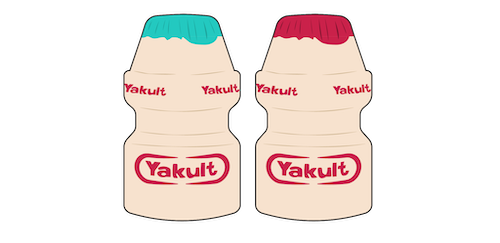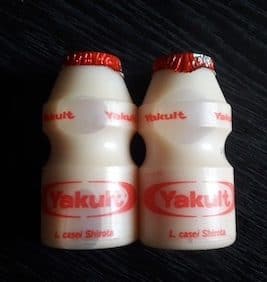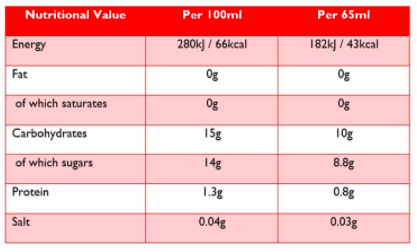Is Yakult A Good Probiotic Option?

Over the years, yogurts and other probiotic products have gone from being a hippy health food to a mass market phenomenon that has revolutionized the food industry.
One of these probiotic products is the extremely popular Japanese drink, Yakult, which has become a superfood for some.
But, your favorite probiotic drink filled with “good bacteria” might not be so good after all.
In this Yakult guide, I will try figure out if this drink is a scam or not.
Yakult 101

Almost a century ago, Yakult and other probiotic products are nowhere in existence. Thanks to Dr. Minora Shirota, a Japanese doctor, Yakult was born.
Dr. Shirota spent years studying microorganisms to contribute to people’s health needs and in 1930 he finally succeeded in discovering a unique strain of lactic acid bacteria that can survive throughout the intestines.
These bacteria are now called Lactobacillus casei Shirota a strain Shirota named after himself.
With the discovery of this new strain, the first-ever Yakult bottle was produced. He named the drink “Yakult” from the Esperanto word “jahurto” which means yogurt.
You may be asking: What country is that language from? Well, it isn’t from any country. It is a constructed international auxiliary language because Dr. Shirota believed that Yakult will become international in the future. Which it did! In 1955, Yakult Honsha Company was established to provide the increasing demand for Yakult.
In the same year, Yakult Central Institute was built to further investigate the use of bacteria in food, cosmetics, and pharmaceutical products. Now, they are present in 38 countries including the United States, Netherlands, and most parts of Asia.
Yakult does not only produce probiotic drinks. Did you know that aside from the original Yakult drink there is also a Yakult moisturizer that costs $1,000? But it is only sold in Japan.
Yakult Ingredients & Probiotic Strain

Ingredients From The Official Yakult Website.
Each 65-ml bottle contains 43 calories and 8.8 grams of sugar.
That little bottle may not be big enough to satisfy your thirst but sugary enough to make you crave more.
One tea-spoon of sugar is around 4 grams so in a bottle of Yakult we could be getting a little over two spoons.
A standard bottle of Yakult contains 20-Billion Colony Forming Units which compared to some of the other Probiotic supplements I have reviewed is quite high. That is a good thing.
Olly Probiotic Gummies for example only contain the Bacillus Coagluans strain and only 2-Billion CFU which is low.
Is Yakult Vegan? No, it contains dairy so Yakult is not vegan.
Want To Learn More About Probiotics? Probiotic 101 Guide
Is Yakult Good For Diverticulitis?
Yakult is a Japanese fermented milk drink that contains the Lactobacillus Casei Shirota probiotic strain. In my L. Casei probiotic guide I did not come across any high-quality medical studies stating that Yakult's L. Casei Shirota probiotic strain can help with Diverticulitis and I couldn't find any user reports on Reddit suggesting that Yakult helped.
According to one guide by Dan Brennan MD in Medicinene.net, people with Diverticulitis should avoid greasy, dairy, sugary and foods with artificial sweeteners. Yakult has both dairy and a large amount of sugar so even if the Lactobacillus Casei Shirota strain was beneficial the dairy and sugary could potentially negate any benefits. Yakult is not good for Diverticulitis because of this.
What Happens if You Drink too Much Yakult?
A bottle of Yakult contains a little more than two teaspoons of added sugar. The AHA recommended sugar intake per day is no more than 9 teaspoons for men and no more than 6 teaspoons for women and children.
Excessive sugar intake can lead to adverse effects that are detrimental to your health including tooth decay, increase in blood sugar, weight gain, skin breakouts. (1)
It's worth noting as well that studies have linked a high intake of sugar to upsetting our microbiome and promoting inflammation and the growth of bad bacteria. (2)
Whether or not you should drink one bottle of Yakult per day depends on what other sources of sugar you are getting in your life. If Yakult is your main source of sugar per day then go for it. Just remember to brush your teeth after. If you are trying to introduce Probiotics into your life for the health benefits you could try fermented foods or a supplement.
These two options have the benefits of offering more probiotic strains, zero-sugar and in some cases prebiotic fiber as well to help digest the probiotic strains.
Final Thoughts
Yakult is a probiotic drink formulated with a 20-billion CFU count with a Probiotic strain that can improve gut microbiome and aid in digestion and IS NOT A SCAM. (3)
The small bottle of Yakut contains around two teaspoons of sugar and other artificial sweeteners which is the main issues in my opinion.
Drinking probiotics can keep us healthy but probiotic drinks that contain more sugars than we need may not be the best choice for our gut health
If you want to get the maximum benefits of probiotics in liquid form you could try a liquid probiotic like Mary Ruth or a natural fermented drink like Kefir which doesn't taste as nice but has more Probiotic Strains and no sugar.

Alicia Harper is a NASM-CNC Certified nutritionist and the editor of ProbioticReviewGirl.
After suffering from recurrent gut issues she spent years researching Probiotics and the microbiome.
She has tested 29+ different Probiotics and is a probiotics expert. As a probiotic fanatic, she has valuable knowledge to share with the world.
As I live in Ireland, I was wondering if you would know if Mary Ruth, and Kefeir, or similar brands are available in Europe.
Hi Owen, I just looked it up and Tesco has Kefir in their store. Mary Ruth’s don’t currently ship to Ireland 🙁
Were you interested in Mary Ruth’s liquid or capsule probiotics?
where can I buy vegan probiotic drink in Granada, Spain?
Thanks heaps. Common sense reviews like this are what i need. Im buying Kefir now . Thanks so much
Thanks for your comment Susan 🙂